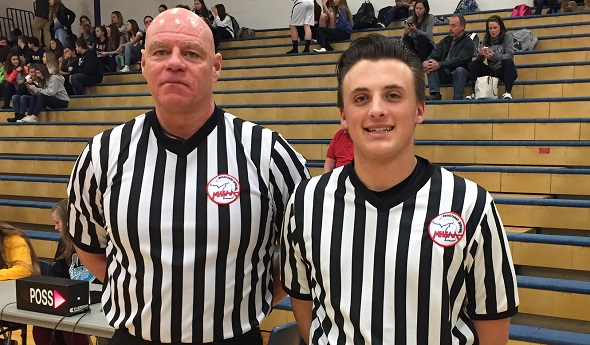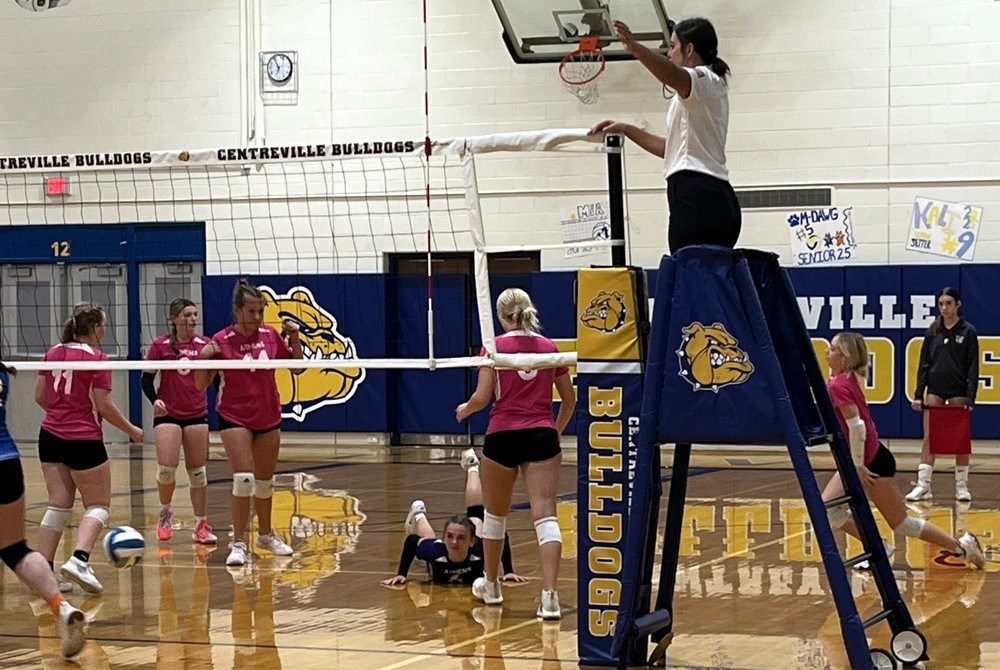
Grand Blanc Senior Joins Officials 'Legacy'
February 15, 2017
By Lisa Paine
Swartz Creek View
HARTLAND – Michigan, not unlike most other states across the nation, is struggling with a shortage of officials for junior high and high school sports. Steve Tannar, the Kensington Lakes Activities Association assigner, says locally that Michigan High School Athletic Association registered officials are down by one third.
Looking to stem the tide, the MHSAA is reaching out to high school juniors and seniors through its Legacy Officials Program.
Jason Caine, a Grand Blanc senior, is working with his veteran partner, Shawn Waterman. Caine said he came across the program through an online application and “just wanted to give it a try.”
“I attended a clinic at Goodrich High, just the basics, and it just took off after that,” said Caine. “After the clinic I attended Rules School and the Genesee County Officials Association (GCOA). Through that, I got partnered with Shawn Waterman (a veteran MHSAA official). They mentor us and show us the basics.”
Caine is also being mentored by eight-year MHSAA official and former coach Brian Morley of Grand Blanc. Caine, who played freshman and junior varsity baseball at Grand Blanc, said he’s not a typical multi-sport athlete.
“I’m a DECA Officer at Grand Blanc,” explained Caine. “It’s a business club that presents their businesses to potential investors. Officiating is a side hobby that I want to pursue. Next year I plan on attending college and with officiating, I can take that with me wherever I go.”
Tannar said the ultimate goal of the Legacy program is to get the word out to recruit more teens like Caine.
“The main reason we are looking to grow our officials program is because we have such an officiating shortage all over the country,” said Tannar. “Not many of us are under the age of 40. The average age of our officials is mid to upper 50s. If we don’t recruit and get them working now, we’re going to be faced with a shortage of officials.”
“It really began when they switched girls basketball (to winter) and everyone tries to play triple headers on Tuesday and Friday,” explained Tannar. “I need 42 officials in one night to fill the six schools I assign for the KLAA.”
Tannar noted that in 2012 the GCOA qualified 125 officials to work in MHSAA tournaments. This year that number dropped to 84.
“Mentoring the rookie officials such as Caine is a big responsibility," said Morley, who is one of three officiating trainers in the area. He’s been officiating in the Saginaw Valley League, Flint Metro League, Genesee Area Conference and KLAA.
“This year we were in an ad for the MHSAA, and Jason was one that responded. He was looking for something other than working at McDonald’s. I told him the MHSAA has a program in place to train officials,” said Morley, who found his own path to the MHSAA officials program as an adult.
Morley also spoke to the number of officials needed.
“We figured for the Saginaw Valley plus the Thumb area and into where Steve is (KLAA), somewhere between 300 and 400 officials are needed on a given Tuesday or Friday,” Morley said.
 Officiating isn’t easy, as it’s about more than just calling the games, noted Tannar.
Officiating isn’t easy, as it’s about more than just calling the games, noted Tannar.
“The number one reason for quitting officiating is the fans and their reactions, not the coaches or players,” Tannar said.
Mark Uyl, assistant director for the MHSAA and its coordinator for officials, echoed that. He’s seen the profession take its hits over the past five years.
“The biggest challenge in officiating is it’s a thankless job,” Uyl said. “We are expected to be perfect on our first day. But you can’t play without officials, so our culture needs to rethink how we are acting as fans in the athletic arena. We are in an angrier society right now and until that trend reverses itself, we face that challenge.”
“So much of officiating is handling people, managing emotions. If we can keep getting people of all ages interested in our officiating program, we can continue to put quality officials at all levels of games – youth sports, junior high through high school and into the college games,” Uyl said.
The fans were one of Caine’s first concerns.
“It was a little nervy at first, but when I got up there, Shawn was a great partner and assured me everything was OK no matter what the outcome,” said Caine. “My background at the clinics and Rules School gave me the confidence.”
Morley explained the importance of teaming up rookies with veterans.
“That’s why this training is so important. If Jason and these others didn’t have us to learn from, lean on, fans can be brutal. Part of our training is how to combat or ignore the angry fans and block that out and do what we need to do in these games. Our job is protect our rookies in their first couple of years to help everyone handle the heat of the moment. We can’t lose someone because of the ugliness that often goes on around us,” said Morley.
The money isn’t bad either. Morley and Uyl said refs can pick up anywhere from $35 to $65 on any given night.
"Many don’t realize how good the money is in officiating,” said Uyl. “After school jobs are $9-10 dollars an hour. (Officiating), they can make $35 in one game.
Tannar said the plan is to turn up recruiting another couple of notches into the next year.
“Next year we want to get into the schools and do a presentation to an all-level program at every school. If I can get one or two kids, that gets us 40 new officials.”
Uyl is grandfathering in Legacy Official students for free, saving them money on the typical registration fees.
More clinics are planned for the Legacy Officials program in the spring and fall of 2017.
This story originally appeared in the Dec. 29, 2016, edition of the Swartz Creek View and is reprinted with permission.
PHOTOS: (Top) Veteran official Shawn Waterman (left) stands with Grand Blanc senior Jason Caine during Caine's first game as an MHSAA referee Nov. 30. (Middle) Caine monitors the action during the junior high game in Hartland. (Photos courtesy of Steve Tannar.)

Southwest 10 Conference Welcoming Volleyball Athletes as Legacy Officials
By
Steve Vedder
Special for MHSAA.com
November 13, 2024
Instead of just hitting a volleyball, Gracie Smith now finds herself enjoying the larger picture.
The Decatur senior has spent the last six years playing volleyball at different levels. But thanks to an innovative new program undertaken by the Southwest 10 Conference, Smith now sees the sport through an entirely new light.
She's one of 13 varsity volleyball players at three schools who've added another paragraph to their resume: officiating.
The players have become MHSAA-registered officials cleared to work Southwest 10 Conference middle school and freshman matches as part of the MHSAA Legacy Program. Smith said the program has contributed much to her love of the game by helping her better understand the officials during her own varsity matches and providing her opportunities to give back to the community and help out a sport in dire need of new officials – in addition to adding a bit of spending money to her budget.
"I am excited about trying this," Smith said. "I can make some extra cash, be at the same level of officials who do our games and take what I've learned on the court and put that knowledge to use.
"I definitely think I'll do this again next year. I can earn a few extra bucks, and I can give something back to the game"
Eric Frohriep, president of the All-Star Officials Association and assigner of officials to Southwest 10 matches, said the project was borne out of a necessity to attract new officials to the sport.
He sent inquires to conference schools looking for high school-aged players willing to undergo officials training that included viewing a video and power point zoom presentation on YouTube. Twenty-three players wound up attending a clinic this past summer, and 13 from Centreville, Decatur and White Pigeon took the next step by registering as officials. They were eligible to work mostly middle school games this fall.
Frohriep hopes the numbers will grow but is more than content with the program's initial steps. He said volleyball is in critical need of attracting new officials to replace those retiring or moving on. He estimates the average age of volleyball officials to be about 60, and the existing cadre of officials is being spread too thin, including a dwindling number of Southwest 10 Conference officials willing to work several nights a week plus weekend tournaments.
"We absolutely have to," he said of attracting new officials. "For those who retire, we're not replacing them fast enough. We've got to lure new officials to maintain the amount of officials we need."
If the new recruits' reactions are any indication, the program is off to a solid start. Decatur senior setter Sienna Potter said it beats other teenage money-making endeavors from babysitting to working at the mall, plus keeps athletes around a sport they love.
"It was fun," said Potter, who worked a handful of both middle school and freshman matches this fall. "I definitely think officiating can be in my future. There's a big need for referees, and I think this was a good idea. I like the money, but I think it also builds my skill in talking to officials at our games. I liked it a lot. It's something interesting, and the money helps out."
Decatur senior Abby Baushke, who has played volleyball competitively for eight years, worked four middle school matches this fall. The experience left her with a more insightful view of the officials she sees at her own varsity matches.
"Plus it helps me give back to the community and helps players understand the sport better," said Baushke, a Wayne State volleyball commit. "I think (officiating) is easier for us because we've played the game. I've learned that it's hard to make quick calls because the game goes so fast. I've played club for four years, and this definitely can be useful to me besides making money."
White Pigeon athletic director Brooke McClure, a former volleyball official, said the program was successful enough that the Southwest 10 elected to start similar programs in basketball and wrestling this winter. Baseball, track, softball and soccer will follow in the spring.
"It's definitely win-win," she said. "There is a shortage of referees and I think, No. 1, these girls are thinking about the game they love and can see the value in that. They're going to learn what it's like to spend a day in officials' shoes. If we can get more girls involved, then this is our contribution to that."
White Pigeon junior Mercede McDaniel, who has played the sport since fourth grade, admits there was a bit of trepidation as she eased into the program, but that was quickly replaced with the confidence of being a registered official.
"It's a nice way to see volleyball," she said. "I was a little nervous at first in trying this, but I love the game. I definitely liked it."
PHOTO Centreville’s Mary Stears stands adjacent and above the net as she officiates a match this fall. (Photo courtesy of the Centreville athletic department.)

